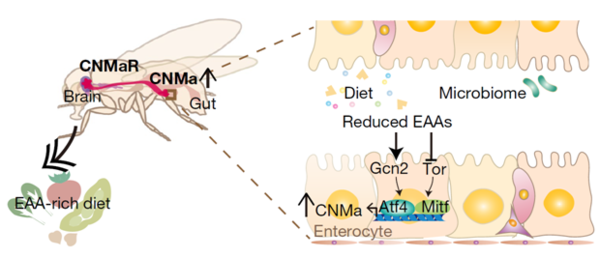A new research by Professor Greg Seong-Bae Suh from the Department of Biological Sciences discovered the gene that is responsible for protein craving during protein deficiency. It is widely known that a diet low in protein will trigger a protein craving feeling that makes the body react more strongly to foods rich in proteins or essential amino acids; however, the mechanism behind it is poorly understood. Professor Suh and Professor Won-Jae Lee from Seoul National University were able to identify the enzymes responsible for this reaction by experimenting on fruit flies. Their research was published in Nature on May 5.

The team conducted their research by depriving the flies of protein in their diet. This protein deficiency triggered the release of a gut hormone called neuropeptide CNMamide (CNMa) from intestine lining cells called enterocytes within the fly. Enterocytes are also the cells responsible for releasing digestive enzymes to help the intestine break down food. “Our study showed that enterocytes have a more complex role than we previously thought,” Professor Suh commented. They also showed that in the event of protein deficiency, gut bacterias called Acetobacter bacteria can produce amino acids to somewhat reduce the effects of a diet lacking in protein. Focusing on the release of CNMa, the research team was also able to identify two signalling pathways that lead from protein deficiency to CNMa hormone production.
The next step in the research would be to identify the way the CNMa hormone interacts with the brain. The team also expressed interest in similar processes in mammals including humans, since protein craving seems to be a universal reaction in animals. “We chose to investigate a simple organism, the fruit fly, which would make it easier for us to identify and characterize key nutrient sensors. Because all organisms have cravings for needed nutrients, the nutrient sensors and their pathways we identified in flies would also be relevant to those in mammals. We believe that this research will greatly advance our understanding of the causes of metabolic disease and eating disorders,” Professor Suh added.

